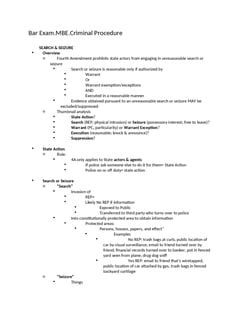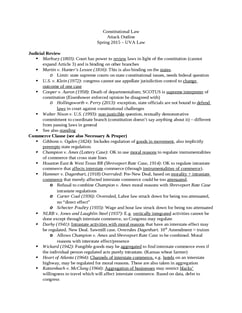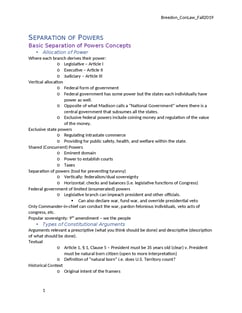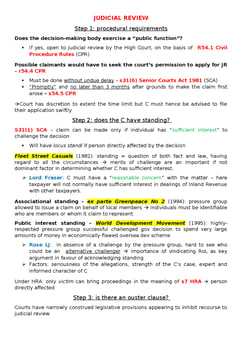McCulloch v Maryland [1819] 17 US 316
Judgement for the case McCulloch v Maryland
Table Of Contents
KEY POINTS
Constitutional Law is an important part of a nation's legal system. It governs the relationships between individuals and their government. It involves the interpretation and application of a country's constitution, which outlines the structure of government and individual rights.
The Supremacy Clause, found in Article VI of the U.S. Constitution, establishes federal law, treaties, and the Constitution as the supreme authority over conflicting state laws. This ensures a unified legal framework and prevents jurisdictional conflicts between federal and state levels.
State Powers refer to the authority retained by individual states within a federal system, allowing them to legislate and govern independently in certain areas. This decentralization accommodates regional variations and preferences while maintaining a balance of authority.
Deliberate Consideration is a fundamental principle in Constitutional Law, emphasizing thoughtful decision-making in legal interpretation and application. It underscores the legal process's intentional and reflective nature, contributing to constitutional systems' stability and adaptability over time.
FACTS
The case revolves around the constitutionality of a Maryland state law that imposed a tax on the Bank of the United States.
-
The Bank of the United States was a federally chartered institution that managed the government's finances.
It had branches, and one of them was located in Maryland.
In 1818, Maryland passed a law imposing a tax on all banks not chartered by the state. The law effectively taxed the Bank of the United States.
James William McCulloch, the head cashier of the Baltimore branch of the Bank of the United States, refused to pay the tax imposed by Maryland.
The case raised fundamental questions about the balance of powers between the federal government and the states, particularly regarding the authority to tax federal institutions.
The central constitutional question was whether Maryland had the authority to tax the operations of the Bank of the United States, considering the supremacy clause of the U.S. Constitution.
Article VI, Clause 2 of the U.S. Constitution, known as the Supremacy Clause, establishes that federal laws and the Constitution take precedence over state laws.
JUDGEMENT
-
The judgment in the case favored the United States and against the state of Maryland.
The U.S. Supreme Court, in a unanimous decision, declared that the Maryland law imposing a tax on the Bank of the United States was unconstitutional.
Chief Justice John Marshall delivered the opinion of the Court.
-
The Court held that the state of Maryland lacked the constitutional authority to tax the operations of the Bank of the United States.
The decision was based on the Supremacy Clause of the U.S. Constitution (Article VI, Clause 2), which establishes that the Constitution and federal laws take precedence over state laws when there is a conflict.
-
The Court interpreted the Necessary and Proper Clause (Article I, Section 8) as granting Congress the power to create the Bank of the United States to carry out its enumerated powers.
Therefore, the state of Maryland could not impede the operations of an institution created by the federal government to exercise its constitutional powers.
The judgment affirmed a broad interpretation of federal powers, particularly in matters deemed necessary and proper for executing constitutional powers.
COMMENTARY
-
Constitutional Law is important in shaping a nation's legal system by defining the interactions between individuals and their government through the interpretation and application of the Constitution.
The Supremacy Clause in the U.S. Constitution establishes federal law, treaties, and the Constitution as the supreme authority, preventing conflicts with state laws.
State Powers allow individual states to govern independently within a federal system, accommodating regional variations while maintaining balance.
In this case, involving the Bank of the United States and Maryland's tax law, the U.S. Supreme Court, led by Chief Justice John Marshall, ruled unanimously in favor of the federal government.
The court declared the state law unconstitutional, emphasizing the Supremacy Clause and interpreting the Necessary and Proper Clause to uphold the broad authority of Congress in matters essential for executing constitutional powers.
For Further Study on McCulloch v Maryland

I entirely handwrote my notes for each subject of the bar exam and then...
Need instant answers? Our AI exam tutor is here to help.
Ask questions 🙋 Get answers 📔 It's simple 👁️👄👁️
Our AI is educated by the highest scoring students across all subjects and schools. Join hundreds of your peers today.
Get StartedSimilar Cases
Related Product Samples
These product samples contain the same concepts we cover in this case.
| Constitutional Law | Con Law Fall 2019 Outline (41 pages) |
| Constitutional Law | Constitutional Law Attack Outline (13 pages) |
| Oklahoma Bar Bundle | Constitutional Law Bar Exam Outline (22 pages) |



 Since 2010, Oxbridge Notes has been a trusted education marketplace, supplying high-quality materials from top achievers at universities like Oxford, Cambridge, LSE, Harvard, and Yale.
Since 2010, Oxbridge Notes has been a trusted education marketplace, supplying high-quality materials from top achievers at universities like Oxford, Cambridge, LSE, Harvard, and Yale.